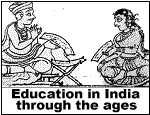Gandhi on Education
Gandhi's Views on Education
First Online: January 05, 2002
Page Last Updated: December 07, 2024
The twentieth century thinking in India is greatly influenced by one man -- Mohandas Karamchand Gandhi. Here are some of his views on the education in general and his ideas for educating the illiterate masses of India in particular.
The Purpose of Education
"The purpose of education is to bring out the best in you"
Ideas to Educate the Masses
"I say without tear of my figures being challenged successfully, that
today India is more illiterate than it was fifty or a hundred years ago,
and so is Burma, because the British administrators, when they came to
India, instead of taking hold of things as they were, began to root them
out. They scratched the soil and began to look at the root, and left the
root like that, and the beautiful tree perished. The village schools were
not good enough for the British administrator, so he came out with his
program. Every school must have so much paraphernalia, building, and so
forth. Well, there were no such schools at all. There are statistics left
by a British administrator which show that, in places where they have
carried out a survey, ancient schools have gone by the board, because
there was no recognition for these schools, and the schools established
after the European pattern were too expensive for the people, and
therefore they could not possibly overtake the thing. I defy anybody to
fulfill a program of compulsory primary education of these3 masses inside
of a century. This very poor country of mine is ill able to sustain such
an expensive method of education. Our state would revive the old village
schoolmaster and dot every village with a school both for boys and girls.
"
(Mahatma Gandhi at Chatham House, London, October 20, 1931)
On Literacy
"Literacy is not the end of education, not even the beginning.
They are not related"
"Literacy must be one of the many means for intellectual development, but we have had in the past intellectual giants who were unlettered"
"It is a superstition to think that the fullest development of man is impossible without knowledge of art of reading and writing. While that knowledge undoubtedly adds grace to life, it is in no way indispensable for man's moral, physical or material growth."
On Importance of Development of Skills
"Literary education must follow the education of the hand --the one
gift that distinguishes man from beast."
![]()
See Also:
-
Multimedia Mahatma -- Memorabilia, biography, excerpts from autobiography, photo archive and links; includes an interactive Ask Gandhi section

